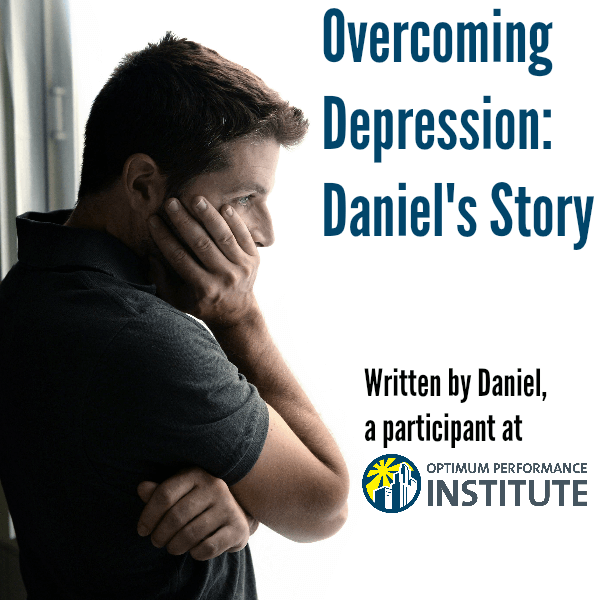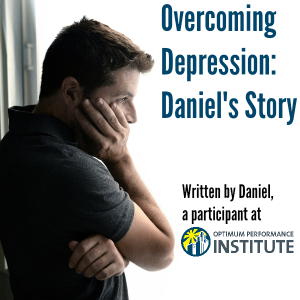
Overcoming Depression: Daniel’s Story
 Not long ago, on a nice sunny day in south Florida, I sat on the edge of my bed, pen and paper in hand, and began to write. I wrote about my life: the trials and tribulations of my despair, my desperate quest for inner peace, and an announcement that I had given up on the fight. I was preparing to throw in the towel and call it a game over. I wrote a message to each of my parents, my brother, my psychiatrist, and some other special people in my life so that they would have something to hold on to; some sort of unreasonable and inconceivable explanation for my departure. It was an unfair gesture made with their best interest in mind.
Not long ago, on a nice sunny day in south Florida, I sat on the edge of my bed, pen and paper in hand, and began to write. I wrote about my life: the trials and tribulations of my despair, my desperate quest for inner peace, and an announcement that I had given up on the fight. I was preparing to throw in the towel and call it a game over. I wrote a message to each of my parents, my brother, my psychiatrist, and some other special people in my life so that they would have something to hold on to; some sort of unreasonable and inconceivable explanation for my departure. It was an unfair gesture made with their best interest in mind.
What in the world could have caused such misery and hopelessness? Sure, I was having a difficult time with school. But could that have been enough to drag me into such a deep state of depression? What about the fact that I didn’t really feel like I had any friends? Could such loneliness cause a person to want to die? There is no doubt in my mind that these factors contributed to my mental illness, but they did not work alone. Biology and genetics surely impacted the progression of my illness. You see, true clinical depression (and any other mental illness) is not a rational result of one’s life experiences or situations. It is an unrelenting burden that comes without warning and does not lift by hearing a motivational speech or going to a party. It is the gray cloud that follows you every place you go. It is an illness, no different than appendicitis or diabetes.
I can offer a particularly unique point of view because I also suffer from a “physical” illness; a neurological condition that, in a nutshell, affects the way blood flows throughout my body. The pain I feel every morning when I try to lift myself out of bed is no different than the excruciating pain of not wanting to be on this Earth. The color of my feet changing every time I stand for several minutes is no different than the color of this world being darkened by the sunglasses that is mental illness. The dizziness and fatigue are no different than the guilt and sadness. They are all just symptoms.
I have no doubt that my mental illness has impacted my physical health and my physical illness has impacted my mental health. Which came first? I will probably never know, but it really doesn’t matter. Everything is interconnected, and the moment we as a society come to understand that our minds are no less important than our bodies, and we value our mental health with equal importance, then I believe people will finally feel comfortable seeking the help they so desperately need. And when that time arrives, ignorance will have been defeated, and people will finally stop dying left and right as a result of mental illness.
Now that I have been in treatment for a while, first in a series of hospitals and currently at Optimum Performance Institute, I have made great strides in lifting my depression and enjoying what life has to offer. But as much as I try to defeat my mental illness, or at least lessen its impact on my life, I know that my life has been forever changed by it. People will always ask themselves if I am suicidal every time I feel very sad. The trauma of almost dying will likely stay with me for a lifetime. My relationship with my parents and brother will never be the same, for better or for worse. Most of all, I will always wonder if there was something more I could have done to evade my depression. For now, all I can do is work my hardest to feel better and ask for forgiveness. I am sorry that I bottled up my emotions and hid them from the world for so long. I am sorry that I cut my arms to help alleviate the emotional pain. I am sorry for thinking that the world would be better off without me. All I am left with are apologies. For goodness sake, that is what mental illness can do to a person.
Stigma nearly killed me, more than once. And if we continue on this same path, then many innocent lives will be permanently lost at the hands of mental illness. Every single death is a tragedy, and right now it is just absurd how many people are suffering in silence. I urge you all, in the strongest possible manner, to reconsider the way you think about mental illness. It is not a choice, nor is it a flaw in character. It is a few of the many cards we were dealt and there need not be any guilt in not having a royal flush.
Please, if you take one thing with you, let it be this: I am not mood disorder, I am not anxiety disorder, I am not eating disorder, and I am not autism spectrum disorder. I am Daniel, and I am a human being. Just like all of you… SURPRISE! We are all human beings with the good and the bad. We are all beautifully imperfect creatures, and the moment we as a society begin to embrace that, then we can begin to move in the direction of acceptance and support for those who need it most in their vulnerable moments in life.
Not everybody comes out on top and gets to tell their story. Some are overcome by their illness and lose the fight. Someone who comes to mind is Christina Tournant, an MIT student who recently committed suicide two years after being diagnosed with the same physical illness that I also deal with. It breaks my heart to know that I could have become another statistic, that my loved ones would never witness my smile again. But I am here now, and I am here with a vengeance. I am here in this world to help dispel the myths of mental illness and contribute to society in a positive way. I hope that one day, we will reach a time when mental illness is viewed in exactly the same regard as other physical illnesses. When that time comes, I have a feeling that people like Christina will be looking down from Heaven and feel proud of what we have accomplished in their memory. Let’s not let the millions and millions of people who have died from suicide to have died in vain. Together, we can make a difference.
With much love,
Daniel
At Optimum Performance Institute, we offer compassionate, clinically sophisticated intensive residential help for young adults who suffer from depression. Rather than a sterile, hospital-like environment, we offer beautiful accommodations in luxury apartments just outside of Los Angeles. At OPI, we treat the individual, not the diagnosis. We are a diverse community of passionate, highly skilled individuals working together with you to help you find your joy and express it. For more information on OPI residential programs and our measures to help young adults with depression, call us at (888) 814-5985 or click HERE to submit an online form. We’ll be in touch promptly.
